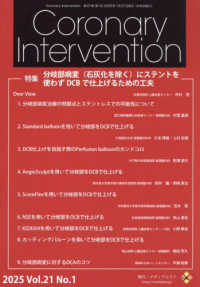- ホーム
- > 洋書
- > ドイツ書
- > Humanities, Arts & Music
- > Linguistics
- > english linguistics
Full Description
Throughout the history of human civilization, the definition of the animal and its relationship to humans have been contentious issues. This book investigates the notion of what constituted an animal in Early Medieval English culture as well as how the animal-human interaction is portrayed in the Anglo-Saxon literary corpus. In this regard, the animal's portrayals in the Exeter Book Riddles and of monstrous creatures in the Wonders of the East provided a fertile field for research because these texts, rarely connected to allegorical readings and offering viewpoints that might be seen as complementary, deal with fundamental issues regarding what it meant to be human for Early Medieval English society.
This study offers fresh insights into the characters and themes explored in the Exeter Book collection and in the Wonders of the East, looking for the spaces of Anglo-Saxon thought in which animality and humanity appear to meet. The author not only discovers the peculiar features in the definition of humanity with regard to animal and non-human figures, but is able to demonstrate that a strong anthropocentric vocation can coexist with an outlook that recognizes a close affinity among different species.
Contents
Table of Contents - Acknowledgments - Preface - Introduction - Chapter One - The Exeter Book collection and the Riddle Tradition - Chapter Two - Prosopopoeia, Anthropomorphism and Empathy - Chapter Three - Riddles and Metamorphosis - Chapter Four - Wonders of the East: men, animals and in-between - Chapter Five - Uncertain Humanity Denied Humanity - Chapter Six - Alien and Familiar - Conclusions - References








